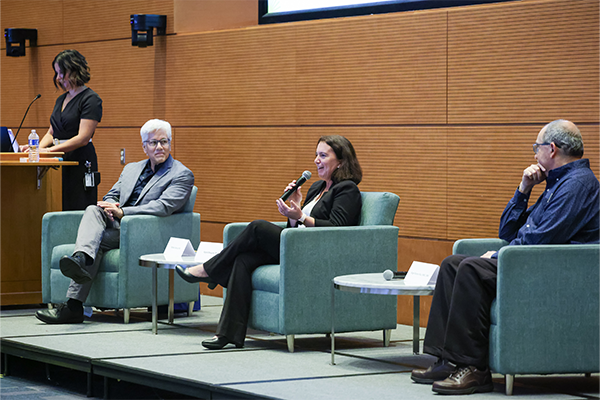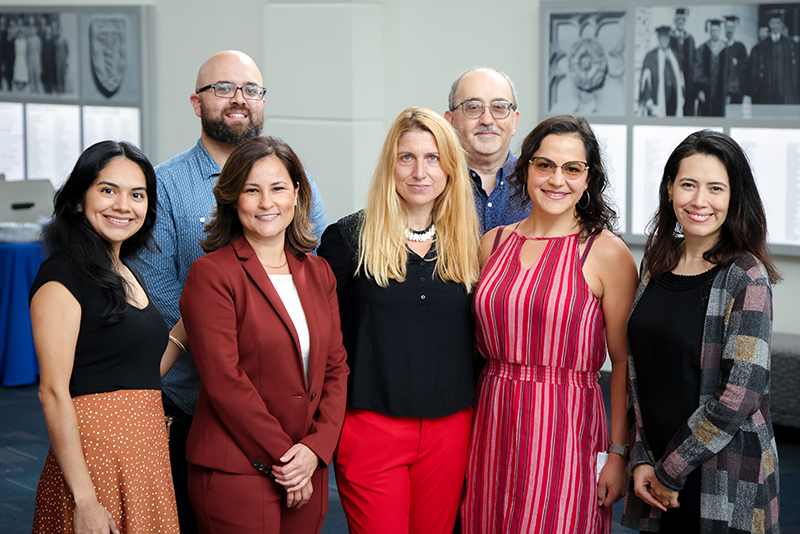
Duke University School of Medicine’s new employee resource group ¡DALHE! (Duke Advancing Latine/Hispanic Excellence) kicked off its inaugural event recognizing Hispanic Heritage Month on Friday, October 6. The event, called Somos (We are) Duke, included lunch, networking, and a panel discussion featuring moderator Roberta Maldonado Franzen, PhD, and panelists María Marquine, PhD; Raphael Valdivia, PhD; and Angel Romero Ruiz.
Raquel Ruiz, founder and lead of ¡DALHE!, encouraged participants to reflect on the valuable impact that Latino and Hispanic individuals have had on Duke, the country, and the local Durham community. She noted their growing presence in the Duke workforce and recognized the contributions of several Hispanic trailblazers throughout Duke’s nearly 100-year history.
The mission of ¡DALHE!, which officially launched in September, is to create a sense of community for Latino and Hispanic employees and foster an inclusive work environment where they can feel valued, heard, and supported.
Ruiz said employee resource groups (ERGs) like ¡DALHE! play an important role in creating community, connection, and a support system to thrive at Duke. They serve as a resource for employees and to the organization.
“We aim to be home to our Latino employee and allies,” Ruiz said. “We will develop programming not just during Hispanic Heritage Month, but all year round.”

During the Somos panel discussion, the panelists shared their backgrounds and what led them to their current roles at Duke, while offering participants advice on how to successfully advance their own careers.
Valdivia, chair of the Department of Integrative Immunobiology, discussed his struggles with imposter syndrome, as someone who was raised in a culture that he said encouraged individuals to work hard but keep their heads down and not self-promote. But he said after coming to the United States and taking on leadership roles at Duke, he quickly learned that it is important to build networks.
He said he was able to overcome his imposter syndrome thanks to support from mentors such as former School of Medicine Dean Nancy C. Andrews, MD, PhD, and his PhD advisor, who once told him, “Your problem is that I have way more faith in you than you do in yourself.”
Valdivia added that he saw very few Latinos in faculty positions within the basic sciences when he started at Duke. He highlighted the importance of representation and having allies and advocates who will stand up for you behind the scenes without your ever knowing it.
Marquine, an associate professor in the Division of Geriatrics, also emphasized the importance of mentorship. She said mentors had a major impact on her career path and are the reason she spends a significant part of her time mentoring others today. “I can’t stress enough how much mentors have meant to me,” she said. “I never thought I would get a PhD,” but her mentors made her realize such achievements were possible.
Romero Ruiz’s advice to attendees included taking continuing studies courses and joining affinity groups, not just within Duke, but outside Duke as well. A program coordinator in the Population Health Management Office, Romero Ruiz also encouraged hiring managers in the audience to engage with human resources to get what they need during the hiring process. For example, his initial efforts to find bilingual candidates for certain positions initially weren’t successful. But with persistence, he found the right candidates. “Sometimes you have to push back in a cooperative way,” he said.
The panelists also shared their thoughts on what could lead to meaningful and sustainable change at Duke. Marquine challenged attendees to consider: “How do we change structures and systems that were not created for the Latino community in mind?” Commenting on the lack of signage in Spanish at Duke Health, she said, “For things like that, unless you are in the person’s shoes, it’s hard to notice.
“I encourage you to share those things with your leadership,” she said, adding that leaders “won’t know what needs to change unless we share our insights with them.”
During the event, participants entered a drawing for signed copies of a book, Making the Latino South: A History of Racial Formation, written by Cecilia Márquez, PhD, who is the Hunt Family Assistant Professor in History at Duke. Lunch was provided by Durham restaurant, El Chapin.
To learn more about joining ¡DALHE! email Latino_HispanicERG@duke.edu.
Photos by Colin Huth